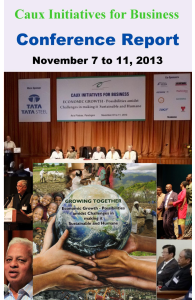 Being ethical, you succeed and sustainably succeed,” affirmed B.Muthuraman, Chairman, Tata International Ltd., while inaugurating the fifth International Biennial Conference of Caux Initiatives for Business (CIB) at Asia Plateau (AP), Panchgani, India which was held from November 7 to 11, 2013.
Being ethical, you succeed and sustainably succeed,” affirmed B.Muthuraman, Chairman, Tata International Ltd., while inaugurating the fifth International Biennial Conference of Caux Initiatives for Business (CIB) at Asia Plateau (AP), Panchgani, India which was held from November 7 to 11, 2013.
More than 200 delegates, speakers and volunteers from 20 countries, including Australia, Denmark, Germany, Kenya, Lebanon, Malaysia, Norway, Romania, South Korea, Switzerland, Taiwan, United Kingdom and United States attended.
Two Plenary Sessions that dealt with the main theme of the Conference were held in the morning for three days. Speakers at these sessions included MD’s, CEO’s, some IAS Officers and a business consultant. Below are some nuggets of Speakers from the six plenary sessions that were held.
- “Good persons work in isolation; we must build a virtuous network,” said the former Chief Secretary of a state in eastern India, AnupMukerji (IAS Retd.), while portraying the transformation of Bihar since 2005.
- “We cannot separate our role as shareholder with that as a citizen,” observed Mark Goyder, the founder of a London-based think-thank, Tomorrow’s Company.
- “Employee engagement has significantly reduced absenteeism, accidents and defects, while increasing productivity and profitability,” stated Dr Armin Bruck, MD & CEO of Siemens India Ltd. “Happy employees are the best requisite for profitability.”
- According to ShishirJoshipura, MD of SKF India Ltd., profit is not just a set of figures; it is a set of values. To make the company more humane and inclusive, special employees’ oriented programmes were started. Thanks to such steps, attrition dropped, profits increased.
- “We first need to understand human nature to isolate the root cause of corruption,” said R. Gopalakrishnan, Director of Tata Sons Ltd., Mumbai. “We have to confront it, only then we can contain it.”
- “A company should be good before it is strong. That sequence is essential,” proclaimed Mr Hironori Yano, the former Chairman of Central Nippon Expressway Company (Nexco)who shared the dais with R Gopalakrishnan.
- In 1991, when Transasia Bio-Medicals Ltd. started manufacturing machines, the R&D department discovered that these machines had defects that led to wrong diagnosis.The CEO knew that the right thing to do was to replace all the machines proactively – an action, his finance people pointed out, would set them back by Rs.20 million. For a company with an annual turnover of Rs.10 million, it was a huge challenge. In two months, all the pieces were replaced. This decision led to unflinching loyalty of the customers.
- The former MD of Tata Metaliks Ltd., Jamshedpur, Harsh Jha, provoked the audience with a question: If so many attendees at the conference believe in high-integrity transactions, then why are we not able to make a huge difference to the society? He further said, “Each one of us has to define a path for ourselves; can we take the next step?”
- The Director of Thermax Ltd., Pune, Ms. Anu Aga called upon the corporate world to play an important role in social transformation, instead of blaming the government. “It’s unfortunate that in the context of the immense social challenges we face, there isn’t much of a debate for businesses to be humane and not just profit-driven.”
- VivekAsrani, MD, KaymoFastner, Mumbai, stated that a business that does not have a purpose beyond profit would not maximise its potential. “This is the true reason why a business must have a purpose beyond profit,” he added.
- Monopoly + Discretion – Transparency = Corruption, proclaimed PradeepKharola (IAS), Chairman of Karnataka Urban Infrastructure Development and Finance Corporation, Bangalore.
On two days, post-tea, the Conference witnessed three parallel panel discussions on the following sub-themes: (a) Obstacles to Growth and Sustainability in the Absence of Good Governance; (b) Leading the Knowledge Worker and (c) Business beyond the Bottom-line—The Key Purpose for Business.
Here are some nuggets of Speakers who spoke at these sessions:
- Anil Chopra, VP (SCM-IM), Siemens Ltd., Mumbai, moderated a discussion on what constitutes growth—can it be measured in GDP (gross domestic product) terms, or do we need to factor in HDI (human development index) as well?
- “CSR is not a waste of money, it gives tremendous returns,” said SaroshGhandy, while citing an instance involving Tata Motors Ltd., Jamshedpur. “We learnt that we cannot manipulate people or manage them, we need to lead them,” said the company’s former Resident Director.
- “Leadership in the organisation today is established by knowing and doing rather than mere designation and entitlement,” said Vijay Paranjape, the Siemens’ former Executive VP and Head of Automation & Drives Division, Siemens Ltd., Mumbai. MrParanjape argued that the policy of incentives had corrupted the Knowledge Worker. “Organisations need to communicate to their KWs that it’s the salary, challenging work environment and most significantly, their contribution that drives them rather than bonuses. Incentives can only perpetuate chaos on the office-floor,” he said.
Delegates at the Valedictory Session of the 2013 Conference also heard Dr. HeitaKawakatsu, Governor of Shizuoka Prefecture, Japan and KishorChaukar, Chairman of Tata Teleservices Ltd. In a fitting conclusion, to the days that dealt with how Economic Growth could be made sustainable and humane, Mr. Chaukar told the audience, “Business is an economic activity that balances the interest of all stakeholders. Making money is an activity, not business.”